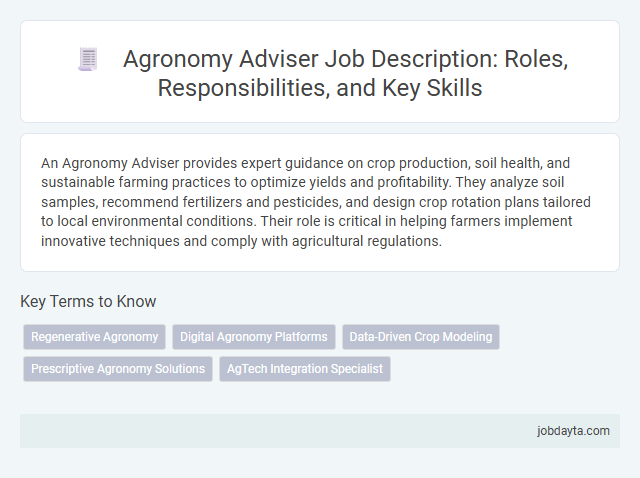An Agronomy Adviser provides expert guidance on crop production, soil health, and sustainable farming practices to optimize yields and profitability. They analyze soil samples, recommend fertilizers and pesticides, and design crop rotation plans tailored to local environmental conditions. Their role is critical in helping farmers implement innovative techniques and comply with agricultural regulations.
Introduction to Agronomy Adviser Role
An Agronomy Adviser provides expert guidance on crop production, soil management, and sustainable farming practices. They analyze soil health, recommend appropriate fertilizers, and help farmers optimize yield efficiency. Their role supports agricultural productivity while promoting environmental stewardship.
Core Responsibilities of an Agronomy Adviser
An Agronomy Adviser plays a crucial role in enhancing crop production through expert guidance on soil management and sustainable farming practices. Their expertise helps farmers maximize yield and maintain environmental health.
- Soil Analysis and Management - Conducts detailed soil assessments to recommend appropriate nutrient applications and crop rotation strategies.
- Crop Production Planning - Develops tailored planting schedules and advises on seed selection to optimize crop growth and yield.
- Pest and Disease Control Advisory - Identifies potential pest threats and suggests integrated pest management solutions to minimize crop damage.
Essential Skills and Qualifications
An Agronomy Adviser provides expert guidance on crop production, soil management, and sustainable farming practices. They analyze soil samples and assess environmental factors to optimize agricultural output.
Key skills include strong knowledge of plant biology, soil science, and pest management techniques. Effective communication and problem-solving abilities are essential to support farmers in improving crop yield and resource efficiency.
Educational Background and Certifications
An Agronomy Adviser typically holds a bachelor's degree in agronomy, crop science, or a related field. Advanced degrees such as a master's or doctorate enhance expertise in soil management, plant physiology, and sustainable farming practices.
Certifications play a crucial role in validating an Agronomy Adviser's skills. Common certifications include Certified Crop Adviser (CCA) and Professional Agronomist licenses. These credentials ensure knowledge in nutrient management, pest control, and environmental stewardship aligns with industry standards.
Key Roles in Crop Management
An Agronomy Adviser plays a crucial role in optimizing crop production through expert guidance on soil health, irrigation, and pest management. Their knowledge ensures sustainable farming practices that enhance yield quality and quantity.
Key roles include analyzing soil samples, recommending crop rotation schedules, and advising on effective fertilization techniques. You benefit from their tailored strategies that improve crop resilience and maximize profitability.
Advising on Soil Health and Fertility
How can an agronomy adviser improve soil health and fertility? Expert agronomy advisers analyze soil composition to recommend precise nutrient management plans. These strategies enhance crop yield while maintaining sustainable soil conditions.
Pest and Disease Management Strategies
| Role | Agronomy Adviser |
|---|---|
| Focus Area | Pest and Disease Management Strategies |
| Core Responsibilities |
|
| Key Pest Management Strategies |
|
| Key Disease Management Strategies |
|
| Benefits to Farmers |
|
Use of Technology in Agronomy Advising
An Agronomy Adviser leverages advanced technologies such as remote sensing, GIS mapping, and data analytics to optimize crop management and soil health. Precision agriculture tools enable accurate monitoring of field conditions, enhancing decision-making for fertilizer application and pest control. Your farm benefits from these innovations by improving yield efficiency and sustainable resource use.
Collaboration with Farmers and Agricultural Teams
An Agronomy Adviser plays a crucial role in enhancing farm productivity through strategic collaboration with farmers and agricultural teams. Effective communication and shared expertise drive innovation and sustainable farming practices.
- Partnership with Farmers - Builds trust and aligns agronomic strategies with the unique needs of each farm.
- Integration with Agricultural Teams - Facilitates knowledge exchange between crop specialists, soil scientists, and farm managers.
- Data-Driven Decision Making - Utilizes field data and crop analytics to optimize yields and resource use efficiently.
You benefit from tailored support that maximizes your farm's potential through collaborative agronomic guidance.
Career Growth and Opportunities in Agronomy Advising
Agronomy advisers play a crucial role in improving crop production and sustainable farming practices. Career growth in this field is supported by technological advancements and increasing demand for expert agricultural advice.
- High Demand for Expertise - Agronomy advisers are sought after due to the need for efficient crop management and soil health improvement.
- Technological Integration - Knowledge of precision agriculture and data analytics enhances career opportunities in agronomy advising.
- Diverse Career Paths - Opportunities exist in government agencies, private agribusiness, research institutions, and consulting services.
Related Important Terms
Regenerative Agronomy
Agronomy advisers specializing in regenerative agronomy implement sustainable farming practices such as cover cropping, crop rotation, and reduced tillage to enhance soil health and biodiversity. These experts support farmers in adopting carbon sequestration techniques and soil restoration methods that improve long-term agricultural productivity and resilience.
Digital Agronomy Platforms
Digital agronomy platforms enable agronomy advisers to analyze vast datasets using precision agriculture tools, improving crop yield predictions and optimizing input usage. These platforms integrate satellite imagery, IoT sensors, and machine learning algorithms to provide real-time, actionable insights for sustainable farm management.
Data-Driven Crop Modeling
Agronomy advisers specializing in data-driven crop modeling utilize advanced algorithms and satellite imagery to optimize planting schedules, irrigation, and fertilization strategies, increasing crop yields and resource efficiency. Integrating real-time weather data and soil sensor inputs enables precise decision-making tailored to specific field conditions and crop varieties.
Prescriptive Agronomy Solutions
Agronomy advisers specializing in prescriptive agronomy solutions utilize advanced data analytics and soil health monitoring to provide tailored crop management strategies that optimize yield and resource efficiency. These experts integrate precision agriculture technologies and field-specific insights to recommend actionable practices that enhance sustainability and profitability for farmers.
AgTech Integration Specialist
Agronomy Advisers specializing as AgTech Integration Specialists leverage precision agriculture tools, satellite imagery, and IoT sensors to optimize crop yields and resource efficiency. Their expertise in data analytics and smart farming technologies drives sustainable agricultural practices and enhances decision-making accuracy on farms.
Agronomy Adviser Infographic

 jobdayta.com
jobdayta.com